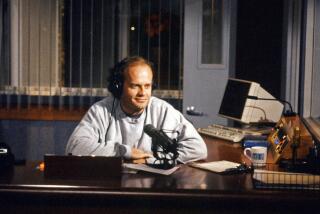Flawed Script : Fries’ Story Shows Problems Facing Small Production Firms
- Share via
One of the most popular TV movies on CBS last year was “Leona Helmsley: The Queen of Mean,” a potboiler with all the ingredients of a classic grade-B flick: family intrigue, power struggles and petty jealousies.
Some of the same plot lines could be found in the tortured saga of the film’s production company, Fries Entertainment.
After years of financial trouble, one of Hollywood’s biggest producers of TV movies filed for bankruptcy protection last month amid criticism that it was mismanaged by its chairman, Charles W. (Chuck) Fries.
Escalating salaries, perks and nepotism flourished despite mounting financial losses, making Fries Entertainment resemble a family business more than a public company, critics say.
“They ran it like a private company and took huge, huge salaries,” says Doug Lowell, an analyst who specializes in following independent production companies for the San Francisco investment firm L. H. Alton & Co.
Now, the bankruptcy court has granted a continuance. But Fries, who says he will reorganize and is hopeful that a buyer will step forward, remains in charge.
The story of Fries Entertainment in many ways exemplifies the plight of small production companies in Hollywood. Squeezed by a highly competitive marketplace increasingly dominated by well-heeled major studios, independents are unable to corral the resources--financing, talent, influence--needed to launch and sustain new TV shows and movies.
Small Hollywood studios were also popular among Wall Street investors in the early to mid-1980s. Seduced by the potential for big profits, a crop of entrepreneur-driven firms like Fries went public--among them Vestron, Heritage and DeLaurentis. Many collapsed or were swallowed by larger studios.
But people associated with Fries Entertainment contend that its marketplace struggles were compounded by a chairman who controls 26.4% of the stock.
Fries (pronounced “freeze”) denies that he mismanaged the company and says he suffered along with the other shareholders. “My family lost $25 million worth of shares,” the 63-year-old producer says. “So I’m just as unhappy as everyone else is here.”
Fries has long cut a flamboyant path. Until his financial problems became too pressing, a chauffeur-driven limousine shuttled him to industry hangouts such as Jimmy’s or Le Dome. With an income approaching $1 million, his earnings still rank him 24th out of 107 entertainment executives, according to Broadcasting magazine.
Fries lives like a mogul: He drives a Rolls Royce, is renovating a $5.6-million, 15-room Beverly Hills mansion, belongs to the swank Bel Air Country Club and was even the subject of a puffy profile on “Lifestyles of the Rich and Famous.”
Although hardly known to the public, Fries is one of the most prolific and successful TV-movie producers in Hollywood.
His credits include “The Burning Bed,” which starred Farrah Fawcett as a battered housewife who sets her husband afire, and “The Hillside Strangler,” about serial killer Angelo Buono Jr.
Locally, the company is conspicuous for the huge Fries Entertainment sign atop its headquarters on Hollywood Boulevard, where Fries has a star in the Walk of Fame.
But the firm’s performance has been anything but stellar. It has lost money four of the past five years. Its stock price has plunged 98% from its peak in 1986.
“He had a dream of being another big filmmaker,” says Carson Cole, an analyst with the Los Angeles-based investment firm Froley, Revy Investment Co., the largest holder of Fries bonds. “If he’d stuck to his knitting, he’d probably be all right.”
Last year a group of shareholders sought to elect its own slate of directors.
At the 11th hour, the effort was dropped when Carol Fries--Fries’ former wife and still a major shareholder--decided against challenging her ex-husband. Today, Carol Fries will not speak publicly about Fries or the company, saying to do so would hurt their eight children.
Observers say Fries would have been better off had he not attempted to use money raised from a January, 1984, stock sale and other cash infusions to create a “full-service” TV and film company.
Although he is recognized as a producer who knows how to make the formulaic TV movies the networks want to buy, his critics are harsh in judging his other talents.
Lawrence Schwartz, a Los Angeles attorney who represented Carol Fries, said that, given the heavy debt payments coming due, “I did not believe the company would last two years.” He described Fries Entertainment as a family-run business “that should never have gone public.”
Martin S. Appel, a director of Fries Entertainment and an attorney who has represented Fries and his company, acknowledges that Fries was slow to react to changes in the production business. But he says the producer “tried everything” to fix the company’s problems, including negotiations with outside investors. No deal was reached, Appel said, because the parties couldn’t agree on “price and terms.”
Before 1984, Charles Fries was a highly regarded producer of made-for-TV movies and miniseries. That business provided him with an extremely comfortable lifestyle: two homes in Beverly Hills, a posh weekend house at Laguna Beach, luxury cars. But the big money was in distribution--selling valuable reruns to local and overseas TV stations.
Carol Fries, who was divorced from her husband in 1985 after 33 years of marriage, sued to stop him from taking the company public in 1984. She contended that he planned to engage in “highly risky and speculative ventures” that jeopardized their “community asset.”
A Los Angeles Superior Court judge allowed the offering to proceed, and the stock that was commonly owned by the two was equally divided. Subsequently, Carol Fries sold some shares, but she still owns 20.5% of Fries Entertainment.
Upon going public, a string of misfired ventures put Fries Entertainment on a financially treacherous path.
“They tried to diversify with insufficient planning and manpower and ended up spending a lot of money, but never generated the income they expected,” said Lowell.
During the past seven years, Fries Entertainment has burned up the original $7.7 million in equity it raised from its public offering, $30 million in convertible bonds and a $26.5-million bank loan. Additionally, it owes at least $4.1 million to a British film financing company, according to company financial reports.
Fries used those funds to finance an expansion into TV program and film distribution, movie production and home video.
One goal was to break into the potentially rewarding first-run syndication business. There were many attempts to come up with a hit show between 1985 and 1988, but all failed. Two early projects, “Cover Story” and “Off the Wall,” the former a celebrity interview show and the latter a late-night comedy revue, led to $650,000 in writeoffs.
“We didn’t have the clout to leverage pilots into series,” explained Allan Schwartz, a former vice president at Fries. “For clout, you need other shows on the air.”
Fries went into the movie business in 1985 and launched a home video operation in 1987. He concentrated on low- to medium-budget action films that were designed to play well in the overseas and home video markets. The company became known for punching out films with appeal to teens, such as “Thrashin’,” billed as a “skateboard romance,” and “Phantom of the Mall.”
After years of spotty success in films and no profits in the home video operation, both divisions were shut down last year.
Fries rejects the notion that he overreached. He says he was caught in the undertow of the crash in the TV-program syndication market during the late 1980s.
A couple years after Fries Entertainment went public, the TV-station economy foundered. Several of Fries’ major clients went bankrupt, and he had to set aside reserves of $6.5 million for doubtful accounts, most of which was never collected.
The emergence of the Fox network also meant fewer opportunities for Fries to sell his movies to local stations.
“No one could have anticipated the Fox network coming into business and (that) the value of movies across the board was going to depreciate,” explains Fries.
The son of a Cincinnati grocer, Fries gained entre to the business through an uncle who was a TV executive. Starting as an accountant, he rose through the ranks working for such studios as Screen Gems and Metromedia.
Fries formed his own independent production company in 1974, Charles Fries Productions. He quickly became known as a producer who could “go to film” on a project, delivering it on time and on budget.
Fries earned a reputation as a hard worker, lugging home boxes of paperwork to labor through over the weekend. But he also was known as a ruthless executive who would go to court over seemingly small matters--especially if they involved money.
Jim Beggs, who was senior vice president of production from 1989 to 1990, went to small claims court to retrieve $3,000 in vacation pay he contended that Fries Entertainment owed him. The court awarded $2,700.
“We both realized this was a game,” says Beggs, who notes that he personally liked Charles Fries. “His mode of operation is to wear the person down.”
Fries says he didn’t want to pay Beggs vacation time because he released him with pay 30 days before the end of his contract.
During the past several years, Fries’s second wife, Ava Ostern Fries, has had a highly visible presence at the company.
Fries made a series of lucrative deals with her production company, Avanti Productions.
Since 1988, Fries Entertainment has paid Avanti $192,500 in fees for developing movies and TV shows, according to the company’s proxy statements. Ava Fries, a onetime commercial and TV actress, is also provided an office and secretary.
Charles Fries says the production fees collected by Avanti were to pay for his wife’s development executive and secretary. “She didn’t collect a penny,” he says. The only show Avanti developed for Fries Entertainment that got on the air was “Born Famous,” a series of 1987 specials hosted by Meredith MacRae about celebrity parents and their kids.
Separately, in 1989, Fries Entertainment paid Avanti $370,500 for his wife’s “personal life story” and for other production services, according to company proxy reports. In an interview, Fries said $350,000 of that amount was for Ava Fries’ life story and her production fee on the film “Troop Beverly Hills,” a comedy starring Shelly Long as a rich Beverly Hills den mother to a failed band of “Wilderness Girls.”
The film was drawn on Ava Fries’ experiences as a Beverly Hills housewife. It was panned by critics and took in only $7.9 million at the box office, according to Baseline, which tracks film attendance.
Fries defends the deal as a sound business decision. He notes that now-defunct Weintraub Entertainment Group financed the $15-million film and paid Fries Entertainment a $700,000 fee, of which half was passed to Avanti and half kept by Fries Entertainment.
“We would never have made that money if we didn’t have her life story available to us,” says Fries.
Even as Fries Entertainment’s financial problems mounted, the company continued to employ family members on generous terms.
Fries’ eldest son, Charles W. (Butch) Fries, who until recently was executive vice president, earned a salary that rose to $359,459 last year from $79,835 in 1983. His pay was rolled back, however, by one-third to a base of $250,000 as part of a new three-year contract as a producer and administrative executive. Two other sons were on the payroll in lower executive positions, although one recently left as part of staff cutbacks.
Fries defends hiring family members and says nepotism has been commonplace at major studios since Hollywood’s earliest days. Although he concedes that the practice “generates attitudes” among critics, Fries insists that his family members are “capable” and have “pulled their weight.”
As for Fries himself, his salary grew to $935,994 in 1991 from $356,260 in 1983, helped along by automatic annual $50,000 raises, according to proxy statements. Last year, Fries agreed to defer half his salary, although that agreement expires next month. The bankruptcy court will approve any future contracts.
“If you ran a check on people in my position who are both executives and creative producers, you would find this is not a lot of money,” he maintains. He adds that the raises were part of a contract negotiated several years ago.
Yet, despite the worsening financial situation, Fries did not have his perks cut back.
According to proxy reports, his firm is paying $122,000 to install and equip a private screening room, security system and phone system at his new Beverly Hills home. Fries says that if his contract is terminated he is liable for a certain portion of that cost.
The company also provides him with a life insurance policy and helps pays for a limousine and “another prestige car” every other year. These “additional benefits” cost $88,000 in 1991 and $83,400 in 1990.
Giving jobs or development contracts wasn’t the only way Fries used the company to help family members.
In her 1984 lawsuit, Carol Fries alleged that the public offering documents did not fully disclose the company’s operations.
For example, she said Fries Entertainment owned a Haagen-Dazs ice cream franchise in Westlake Village, an enterprise that she maintained had no other value than to employ their daughter and son-in-law. Chuck Fries says the ice cream parlor, which was eventually closed, was a business investment.
Aside from some films that turned out to be turkeys, Fries doesn’t think he made any major mistakes.
“I made decisions based on the market forces at the time,” he says. “The market forces in many instances turned against us.”
TV Movie Firm’s Financial Plunge The finances of Los Angeles-based Fries Entertainment, a leading producer of movies for television, began darkening from the moment the company went public. The stock price collapsed, losses widened and debt increased--all as the salaries and perks of chief Charles W. Fries and his son, Charles M. Fries, kept rising. Oct. 16: Fries Entertainment files for Chapter 11 bankruptcy. As company losses increased . . .long-term debt mounted . . .while compensation for Fries . . .and his son grew.
More to Read
The biggest entertainment stories
Get our big stories about Hollywood, film, television, music, arts, culture and more right in your inbox as soon as they publish.
You may occasionally receive promotional content from the Los Angeles Times.










